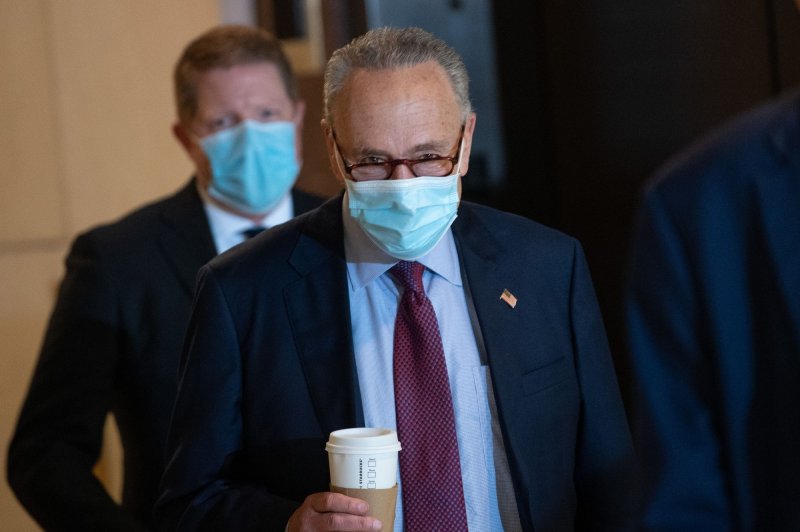Senate Minority Leader Charles Schumer, D-N.Y., proposed Thursday a $350 billion Economic Justice Act to address systemic racism and underinvestment in communities of color. Photo by Kevin Dietsch/UPI |
License Photo
July 16 (UPI) -- Senate Democrats released a $350 billion proposal Thursday for communities of color disproportionately hard hit by COVID-19.
Senate Minority Leader Charles Schumer, D-N.Y., unveiled the proposal called the Economic Justice Act in a Twitter post.
The proposal would include $135 billion for child care, expanding and improving access to community healthcare, federally supported jobs, training and at-risk youth initiatives, and capital and support for minority-owned businesses. The remaining $215 billion would be for building 21st century infrastructure, new homeowner down payment tax credit, renters and low-income housing tax credit, expanding Medicaid coverage and addressing maternal mortality and health.
"Long before the pandemic, long before the recession, long before this year's protests, structural inequalities have persisted in health care and housing, the economy and education," Schumer said in a statement. "COVID-19 has only magnified these injustices and we must confront them with lasting, meaningful solutions that tear down economic and social barriers, and reinvest in historically underserved communities. The Economic Justice Act is a needed step in a long journey to address systemic racism and historic underinvestment in communities of color."
Fourteen other Senate Democrats were listed as co-sponsors of the Economic Justice Act.
"Longstanding systemic health and social inequalities have put some members of racial and ethnic minority groups at increased risk of getting COVID-19 or experiencing severe illness regardless of age," according to the Centers for Disease Control and Prevention.
As of June 12, Black and Non-Hispanic American Indian or Alaska Native people have hospitalization rates five times as high as White people. Latinx people have a hospitalization rate four times that of White people.
African Americans are also more likely to work front-line jobs deemed "essential," during the pandemic, have higher rates of preexisting conditions such as diabetes, hypertension, asthma and diabetes, and live in more densely populated housing, according to the Economic Policy Institute. African Americans make up 12.5% of the U.S. population but account for 22.4% of COVID-19 deaths, EPI said in a June report.
The Economic Justice Act would be partially funded by re-programming $200 billion of unspent funds from March's $2 trillion CARES Act. It would be in addition to the $3 trillion HEROES Act the House passed in May, not a replacement, Senate Democrats noted in the summary.
The HEROES Act for COVID-19 relief would provide money for state and local governments, rental and mortgage relief, hazard pay for front-line workers and funds to support vote-by-mail efforts. The HEROES Act would also provide a second round of direct payments of up to $1,200 for individuals and $2,400 for joint filers.
By comparison, the COVID-19 relief package amount of the GOP proposal is still much smaller, at roughly $1 trillion.
Senate Democrats have been pushing Republicans to take up the $3 trillion HEROES Act the Democratic-controlled House passed in May, but the GOP has rebuked it as a Democratic wish list, Politico reported.
Senators are expected to be back in the capitol Monday, only a few weeks before August recess.
Republicans and Democrats remain divided on issues such as extending boosted unemployment benefits and providing aid for state and local governments, but congressional leaders have signaled they are confident that they can reach a deal, according to Politico.















